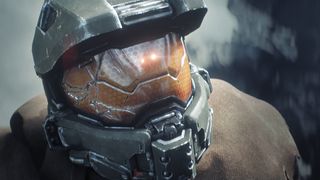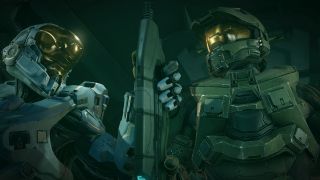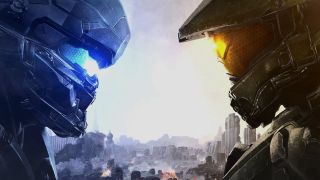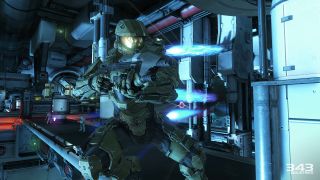Never-starting story

Halo 5 does not have a story. It has characters, and locations, and some things that happen, but it fails to make a story out of them. But please don't think that I'm criticising Halo 5's plot for the things that we usually pull games up on. This isn't about shallow characters, or ludicrous events, or crappy dialogue. Neither is it about the series usual habit of putting wider lore before concrete story. Rather, Halo 5 represents a break-down in the fundamentals of meaningful narrative. It is a game that flies in the face of every golden rule of character design, pacing, story arcs, and the creation of drama, rules which have existed and been vital to effective narrative since the early days of the folk tale.
Where many other video games have storytelling problems, Halo 5 is rather a stand-out case, such is the number of basic things that it gets wrong. All of its issues stem from one, very simple failing, which I'll start by addressing, but good Lord, do they ever spiral from there. Click on, and I'll show you how deep this one goes. Or not deep, as the case might well be. And needless to say, spoilers ahead from here.
It's just the first act of an incomplete story

Act structure is vital to effective storytelling. The pace and ordering with whichyou reveal and escalate things is all-important. You first need to intrigue, entice, and engage your audience, and then once you have your set-up established, you need to lay out and expand the direction of your journey in order to ensure that by the time the plot is really rolling, that audience is too invested to look away. The broad strokes version of good story structure is pretty simple. In act one, we are introduced to our protagonist(s), have their personality and status quo established, and are ideally made sympathetic to them. Then, following some manner of initiating event, their journey begins.
By the end of act one, theyve begun to explore the world (literally, figuratively, or both), are starting to grow, and are approaching a major revelation or defining moment of conflict that will shape the rest of the story, beginning with act two. In act two, the story proper kicks off, our hero forced to step up and evolve in order to address the challenges, as their hardship escalates. Act three builds to the final confrontation, after which, if the protagonist is victorious, they will return home (again, literally or figuratively), changed and grown in some way, to establish a new status quo.
Halo 5 only gets as far as the end of act one. Yes, its the start of a new trilogy, following Halo 4s transitional story, but it neglects to tell a contained story in its own right. Look at Star Wars. Look at Back to the Future. Look at Lord of the Rings. Thats how you do it. Halo 5 is what youd get if A New Hope ended with Luke seeing the Death Star for the first time, after two hours shuffling around Mos Eisley doing nothing. Thats because
Barely anything that happens truly matters

A lot of things happen in the gameplay of Halo 5. Youll go to a few different planets and shoot a lot of enemies. But the events underpinning and justifying those action sequences? Filler. Halo 5 knows that its story only goes to the end of act one, and so to avoid being three hours long, it artificially extends its running time with a whole lot of superfluous happenings that dont inform or influence the direction or the outcome of the story at all. Lockes investigation of Meridien? It goes nowhere. The eventual, brief confrontation with Chief has no effect on either plot trajectory or character arcs. We see a Guardian, but dont interact with it, and it goes away. No-one gains or learns anything, and we then move to Sanghelios.
Sanghelios? More narrative filler. The Covenant civil war has nothing to do with the main events of Halo 5. Its a side story that has no bearing on the plot whatsoever. But we need a few more hours of gameplay, because there are now no narrative events left until the end, so we go here and shoot some Covenant for a while. We find The Arbiter and help him strike a blow against the Covenant hold-outs, but the entire story is self-contained and has zero knock-on effect. Genesis? Roughly the same deal. The Chief and Locke each independently make their way to Cortana, vaguely promised answers along the way, but we simply engage in a multitude of arbitrarily rationalised fights which have no narrative purpose other than to extend the games running time. In fact, most transparently, the only in-game excuse for these battles is that they do indeed exist just so that the Warden can slow the protagonists down. In this respect, Halo 5 and the Warden are one and the same. Its painfully transparent.
The Warden is meaningless as a villain

Who is the Warden? What does he do? What is he for? In truth, hes just a cipher, a walking, talking excuse for Halo 5s artificial extension of its running time. Were told in the second half of the game that he wants to stop the Spartans from reaching Cortana, lest they manage to talk her out of her grand plan, and with that brief hand-wave out of the way, thats all that he does. He interacts with the story and its protagonists only insofar as throwing enough enemies at them to make three hours of material last for nine. As a villain, hes a total failure, lacking agency, purpose, or any kind of a story arc.
A meaningful villain has to have a developing relationship with the protagonist. Drama, at its root, comes from conflict. Without conflict, without the protagonists' actions having a direct effect on those of the antagonist, and vice versa, there is no conflict. Stories are about how events resonate and affect each other, not simply the fact that they happen. To top off his redundancy, late in the game we learn that the Wardens presence and one-note actions truly are meaningless. When the Chief finally confronts Cortana, despite the Wardens best efforts, we learn that she cannot be dissuaded from her goal, and only invited Chief along to see if he would back her up. The Warden needed do nothing.
Worse, when the Warden ultimately threatens to (easily) overwhelm Blue Team - which for some reason he didnt do hours ago Cortana effortlessly shuts him down, vetoing any power or presence he seemed to have, and rendering all of his previous efforts utterly without weight. He doesnt hold real power, and he was never going to be allowed to stop the Chief. So why is he even here, except to make the game last longer? And lets not get into how screwed up and illogical all of this makes Cortanas actions and motivation.
Theres no tension between Locke and the Chief

Its a classic and effective narrative trope to have two, would-be heroes at odds with each other for the first part of a story, only to overcome their differences and realise their greater, combined strength later on. Luke and Han. Bayonetta and Jean. Every pro wrestling heel-face turn ever. It all plays into the conflict, resolution, character growth and status quo shift stuff at the core of all effective drama. But Halo 5 doesnt seem to understand that.
It doesnt seem to understand that for resolution to happen, you have to have a conflict in the first place. Thus, Chief and Locke partake in their journeys to the games culmination almost entirely independently, meeting only once, very briefly, and rarely even expressing an opinion on each other at any other time. There is almost zero actual relationship between them, let alone any clash of ideals to be overcome. As slight as Halo 5s narrative is, there was at least scope to build a satisfying, personal story arc to mask the lack of meaningful events or structure. Even just a couple of simple, gameplay-driven showdowns between the two teams would have added immense emotional weight. You can't fail to question the moral shades of grey in a conflict when having to actively, aggressively engage in it. But the game does not do this, nor much of anything else.
Lockes half of the story could easily be removed to no ill effect

If you need any stronger case for the meaninglessness of most of Halo 5s happenings, imagine the game without Jameson Locke in it. Imagine a game driven purely by Master Chief, and made up of only the Chiefs stages. What changes in terms of the storys key events, causality and outcome? Nothing. The Chief discovers that Cortana might still be alive, goes to where she might be alive, finds out slightly more about her plan, and is then incapacitated as she executes said plan. Then the game ends. That is Halo 5s story. Aside from the tenuously shoe-horned matter of Chiefs imprisonment, there is no reason for Lockes involvement whatsoever, his squads rescue of the big MC the most token, last-minute nod to his inclusion.
The Covenant civil war? Osiris Team are just along for the ride. They leave halfway through, before we even see the Arbiter achieve victory, and whatever their influence on events before that, as previously pointed out, this whole side-story is self-contained and has no effect on the main plot. In fact, beyond that, once you take into account that Cortanas plan is to bully the galaxy into peace upon pain of death, the entire civil war is a moot point anyway. Its going to end, and nothing that Osiris, or the Arbiter, or the Covenent does matters. Locke, like so much of what happens in Halo 5, serves only to extend a first acts worth of story to the running time of a full game. He adds to, and affects, nothing. But actually, it gets worse than that.
No-one has any agency

Remove Locke and Master Chief from the story. Imagine that neither of them bothers to get out bed that day. Say that the UNSC doesnt send anyone else in their stead. What changes then? Still nothing. Cortana rises to power on Genesis, motivates the galaxys AIs to join her cause, and then flexes her strength, immediately dominating every civilisation that stands before her. And the game ends. It works out the same. However meaningless their actions along the way to the end of the game, Halo 5s biggest crime is that it does not allow either of its protagonists to have any effect on the outcome of the story whatsoever. I place protagonist in inverted commas there, because this revelation means that theyre not actually protagonists at all. Theyre simply passengers in someone elses story. And thats the cardinal sin of bad narrative structure.
If your lead character is passive, if they have no effect on events, and events have no tangible effect on them, then they are not a lead character and there is no story. There is simple Some Stuff That Happens. This is non-negotiable. Its the golden rule of storytelling. To paraphrase Ludwigs excellent summation when we were chatting about the game the other day, Halo 5 is about no more than two men separately running to catch at train. They both miss the train, and then they go home. There is no story in that. Had the train simply been a MacGuffin, a catalyist for a story that happens along the way, with events, discoveries, interactions and revelations that change those two men and/or their relationship, then theres story of sorts in that. But Halo 5 doesnt do any of that either. Its a first act, and no more, and now we probably have to wait at least two years for its story to really start.

